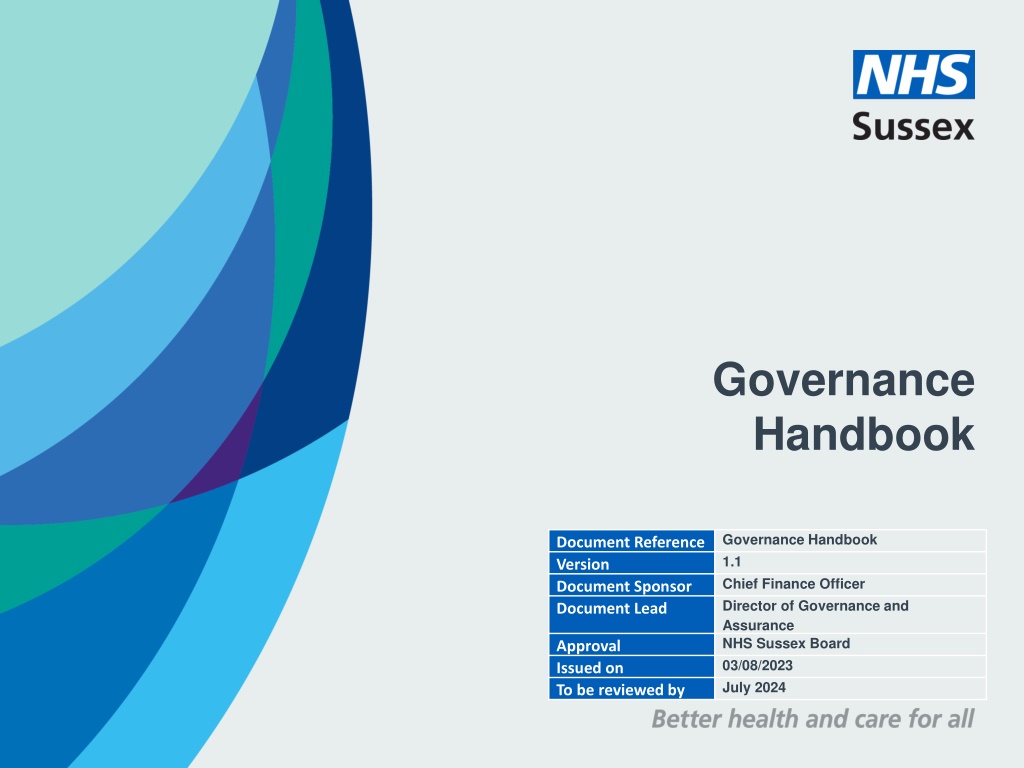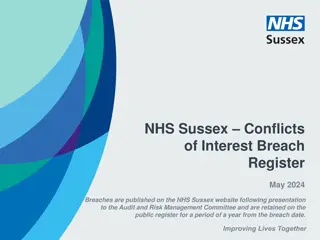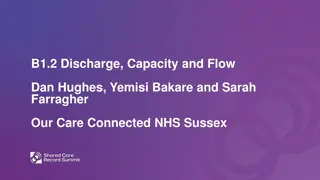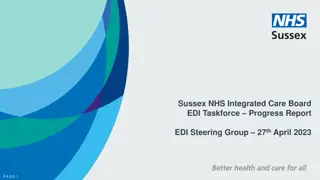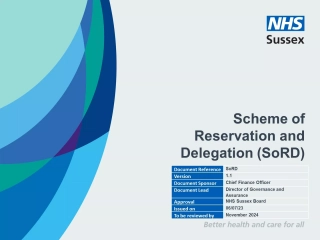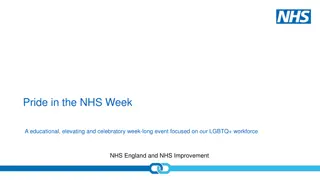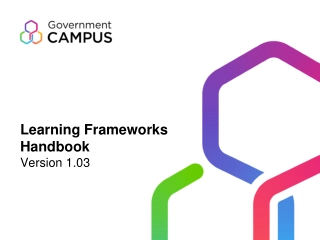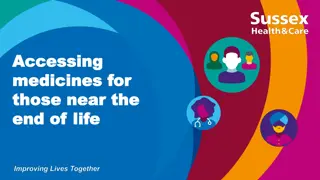NHS Sussex Governance Handbook Overview
This Governance Handbook for NHS Sussex outlines corporate governance arrangements to support the implementation of the NHS Sussex Constitution. It includes key documents promoting good governance, such as terms of reference, delegation schemes, and policy documents. The handbook emphasizes the importance of lawful decision-making, meeting statutory duties, and enhancing scrutiny. It also highlights NHS Core Values, focusing on respect, quality of care, and compassion in healthcare services.
Download Presentation

Please find below an Image/Link to download the presentation.
The content on the website is provided AS IS for your information and personal use only. It may not be sold, licensed, or shared on other websites without obtaining consent from the author. Download presentation by click this link. If you encounter any issues during the download, it is possible that the publisher has removed the file from their server.
E N D
Presentation Transcript
Governance Handbook Governance Handbook 1.1 Chief Finance Officer Director of Governance and Assurance NHS Sussex Board 03/08/2023 July 2024 Document Reference Version Document Sponsor Document Lead Approval Issued on To be reviewed by
Contents Section 1 Introduction and Overview Section 2 ICS Governance Framework Section 3 - The Integrated Care Partnership Sussex Health & Care Assembly Section 4 - The Integrated Care Board NHS Sussex Section 5 NHS Sussex Board Assurance Committees Section 6 NHS Sussex Executive Structures Section 7 System Governance Arrangements Section 8 Place-based Partnerships Section 9 NHS Provider Collaboratives Section 10 Primary medical services and other commissioning responsibilities delegated to NHS Sussex
Section 1 Introduction and Overview 1.1 Purpose of the Handbook 1.2 NHS Core Values 1.3 The Nolan Principles 1.4 How the NHS Sussex Board will operate
1.1 Purpose of the Handbook This Governance Handbook brings together a range of documents which supports the NHS Sussex Constitution and promotes good corporate governance. Corporate governance regulates the power and decision making of the people who have been given responsibility for the stewardship of public assets and healthcare services. In NHS Sussex good corporate governance will protect both patients and public funds. It exists to ensure that decision-making is lawful, statutory duties and wider legal, regulatory duties are met, and that decision-making is enhanced from a quality and scrutiny perspective. This Handbook sets out in detail the corporate governance arrangements that will support the implementation of the NHS Sussex Constitution. It contains practical procedural details for applying the Constitution, including the Terms of Reference for NHS Sussex Board Committees, the Scheme of Reservation and Delegation, the Functions and Decision Map, Standing Financial Instructions and other key policy documents. In short, it is a collection of key documents and underpinning policies, designed to promote good corporate governance. If there is any ambiguity between the NHS Sussex Constitution and this Handbook, the interpretation in the Constitution will apply.
1.2 NHS Core Values The NHS Core Values, are set out in the NHS Constitution: Respect and dignity: We value each person as an individual, respect their aspirations and commitments in life, and seek to understand their priorities, needs, abilities and limits. We take what others have to say seriously. We are honest about our point of view and what we can and cannot do. Commitment to quality of care: We earn the trust placed in us by insisting on quality and striving to get the basics right every time: safety, confidentiality, professional and managerial integrity, accountability, dependable service and good communication. We welcome feedback, learn from our mistakes and build on our successes. Compassion: We respond with humanity and kindness to each person s pain, distress, anxiety or need. We search for the things we can do, however small, to give comfort and relieve suffering. We find time for those we serve and work alongside. We do not wait to be asked, because we care. Improving lives: We strive to improve health and well-being and people s experiences of the NHS. We value excellence and professionalism wherever we find it in the everyday things that make people s lives better as much as in clinical practice, service improvements and innovation. Working together for patients: We put patients first in everything we do, by reaching out to staff, patients, carers, families, communities, and professionals outside the NHS. We put the needs of patients and communities before organisational boundaries. Everyone counts: We use our resources for the benefit of the whole community, and make sure nobody is excluded or left behind. We accept that some people need more help, that difficult decisions have to be taken and that when we waste resources we waste the opportunities of others. We recognise that we all have a part to play in making ourselves and our communities healthier.
1.3 The Nolan Principles The Committee on Standards in Public Life (Nolan Committee) set out in 1995 seven principles of public life which should apply to all in public service (The First Report of the Committee on Standards in Public Life, 1995). These principles have been adopted as the basis for working practices within NHS Sussex. It is intended that all our staff and all members of the NHS Sussex Board, will recognise and uphold them at all times. Selflessness: Holders of public office should act solely in terms of the public interest. Integrity: Holders of public office must avoid placing themselves under any obligation to people or organisations that might try inappropriately to influence them in their work. They should not act or take decisions in order to gain financial or other material benefits for themselves, their family, or their friends. They must declare and resolve any interests and relationships. Objectivity: Holders of public office must act and take decisions impartially, fairly and on merit, using the best evidence and without discrimination or bias. Accountability: Holders of public office are accountable to the public for their decisions and actions and must submit themselves to the scrutiny necessary to ensure this. Openness: Holders of public office should act and take decisions in an open and transparent manner. Information should not be withheld from the public unless there are clear and lawful reasons for so doing. Honesty: Holders of public office should be truthful. Leadership: Holders of public office should exhibit these principles in their own behaviour. They should actively promote and robustly support the principles and be willing to challenge poor behaviour wherever it occurs.
1.4 How the NHS Sussex Board will operate The Board of NHS Sussex has agreed that it will operate according to the following principles: mutual respect for the professional expertise, statutory responsibilities, internal accountabilities and approval processes of each partner organisation an inclusive approach where contributions are sought pro-actively from multiple contacts within partner organisations and within the diverse communities we serve ambitious about the opportunities for innovation, change and improvement at every level of the health and care system willing to collaborate to find mutually acceptable solutions that improve the outcomes, access or experience for the users of our services act with integrity, listen to different opinions and make decisions based on data, with an understanding of the impact this will have on the patients and users of our services.
Section 2 ICS Governance Framework 2.1 Statutory Framework for Integrated Care Systems 2.2 The purpose of Integrated Care Systems 2.3 The Sussex Health and Care System 2.4 Sussex Health and Care System Strategic Ambition 2.5 Sussex Health and Care System Functions and Decisions Map
2.1 Statutory Framework for Integrated Care Systems Integrated Care Systems (ICSs) are partnerships of organisations that come together to plan and deliver joined up health and care services, and to improve the lives of people who live and work in their area. Following the Health and Care Act (2022), 42 ICSs were established across England on a statutory basis on 1 July 2022. Each ICS will include: an Integrated Care Partnership (ICP) a statutory committee jointly formed between the NHS Integrated Care Board and all upper-tier local authorities that fall within the ICS area. The ICP brings together a broad alliance of partners concerned with improving the care, health and wellbeing of the population, with membership determined locally. The ICP is responsible for producing an integrated care strategy on how to meet the health and wellbeing needs of the population in the ICS area. an Integrated Care Board (ICB) a statutory NHS organisation responsible for developing a plan for meeting the health needs of the population, managing the NHS budget and arranging for the provision of health services in the ICS area. local authorities in the ICS area, which are responsible for social care and public health functions as well as other vital services for local people and businesses within each ICS, place-based partnerships lead the detailed design and delivery of integrated services across their localities and neighbourhoods. The partnerships involve the NHS, local councils, community and voluntary organisations, local residents, people who use services, their carers and representatives and other community partners with a role in supporting the health and wellbeing of the population. provider collaboratives bring providers together to achieve the benefits of working at scale across multiple places and one or more ICSs, to improve quality, efficiency and outcomes and address unwarranted variation and inequalities in access and experience across different providers
2.2 The purpose of Integrated Care Systems The purpose of Integrated Care Systems (ICSs) is to bring partner organisations together to: improve outcomes in population health and healthcare tackle inequalities in outcomes, experience and access enhance productivity and value for money help the NHS support broader social and economic development. Collaborating as ICSs will help health and care organisations tackle complex challenges, including: improving the health of children and young people supporting people to stay well and independent acting sooner to help those with preventable conditions supporting those with long-term conditions or mental health issues caring for those with multiple needs as populations age getting the best from collective resources so people get care as quickly as possible.
2.3 The Sussex Health and Care System (1 of 2) The Sussex ICS, or the Sussex Health and Care Partnership as it has been known, covers the geographical footprint of the three local authorities in Brighton & Hove, East Sussex and West Sussex, with a population of 1.7 million people. The four Statutory Partners in the Sussex Health & Care System are: NHS Sussex Integrated Care Board Brighton & Hove City Council East Sussex County Council West Sussex County Council The seven NHS Provider Partners in the Sussex Health & Care System are: East Sussex Healthcare NHS Trust Queen Victoria Hospital NHS Foundation Trust South East Coast Ambulance Service NHS Foundation Trust Surrey and Sussex Healthcare NHS Trust Sussex Community NHS Foundation Trust Sussex Partnership NHS Foundation Trust University Hospitals Sussex NHS Foundation Trust
2.3 The Sussex Health and Care System (2 of 2) The Primary Care Partners in the Sussex Health & Care System are: 33 GP Practices in 6 Primary Care Networks and 53 Pharmacies in Brighton & Hove 54 GP Practices in 12 Primary Care Networks and 97 Pharmacies in East Sussex 75 GP Practices in 20 Primary Care Networks and 150 Pharmacies in West Sussex A wide range of other Voluntary, Community and Social Enterprise Partners are also involved in providing health and care services in Sussex. In Sussex a conscious decision has been taken to replace the three letter acronyms in the Health & Care Act with names that are more descriptive of the purpose of each component part of the proposed new governance arrangements in Sussex: The ICS is known as the Sussex Health & Care System or thesystem The ICP is known as the Sussex Health & Care Assembly The ICB is known as NHS Sussex
2.4 Sussex Health & Care System Strategic Ambition
2.5 Sussex Health & Care System Functions and Decisions Map
Section 3 The Integrated Care Partnership Sussex Health & Care Assembly 3.1 Sussex Health & Care Assembly core purpose 3.2 Sussex Health & Care Assembly - membership 3.3 Sussex Integrated Care Strategy
3.1 Sussex Health & Care Assembly core purpose The Sussex Health & Care Assembly will be jointly established by NHS Sussex, Brighton & Hove City Council, East Sussex County Council and West Sussex County Council as a Joint Committee in accordance with the Constitutions of each statutory organisation. Core purpose:to agree the strategic direction and facilitate joint action across a broad alliance of organisations to improve the outcomes, equality of access and patient experience of health and care services for all communities across Sussex. Key decisions made by the Sussex Health & Care Assembly include: - approval of an integrated care strategy for Sussex, built from the three health and wellbeing strategies for each of our places - approval of the next iteration of the Sussex 2025 Vision when it needs updating - approval of a consistent and prioritised list of health and care needs across Sussex The Sussex Health & Care Assembly will meet in public at least two times per year and will be chaired by the Chair of NHS Sussex, with the meeting administration provided by NHS Sussex. The conclusions from each meeting of the Sussex Health & Care Assembly will be reported to NHS Sussex and the Health & Wellbeing Board of each local authority. Terms of reference for the Sussex Health & Care Assembly
3.2 Sussex Health & Care Assembly - membership The membership of the Sussex Health & Care Assembly reflects the partners in the Sussex Health & Care System. Members Role Chair, NHS Sussex Chief Executive Officer, NHS Sussex Chief Delivery Officer, NHS Sussex 3 x NHS Sussex Members Chair, Brighton & Hove Health & Wellbeing Board Chair, East Sussex Health & Wellbeing Board Chair, West Sussex Health & Wellbeing Board 3 x Local Government Members* * To be supported by Local Authority Officer as appropriate Lead Executive, Brighton & Hove Health & Care Partnership Lead Executive, East Sussex Health & Care Partnership Lead Executive, West Sussex Health & Care Partnership 3 x Place Executive Members Lead Clinician, Brighton & Hove Health & Care Partnership Lead Clinician, East Sussex Health & Care Partnership Lead Clinician, West Sussex Health & Care Partnership 3 x Place Clinical Members 3 x Voluntary, Community & Social Enterprise Members* VCSE Member, Brighton & Hove VCSE Member, East Sussex VCSE Member, West Sussex Chief Executive, Healthwatch Brighton & Hove Chief Executive, Healthwatch East Sussex Chief Executive, Healthwatch West Sussex 3 x Independent Health and Social Care Champion Members Vice Chancellor, University of Brighton Vice Chancellor, University of Chichester Vice Chancellor, University of Sussex 3 x University Members Further Education Member Housing Member Local Enterprise Member 3 x Specialist Members
3.3 Sussex Integrated Care Strategy Section 116ZB of the Health & Care Act confers a responsibility upon the Sussex Health & Care Assembly to develop an integrated care strategy for our whole population using best available evidence and data, covering health and social care (both children s and adult s social care), and addressing the wider determinants of health and wellbeing. The strategy sets out how the assessed needs of our population are to be met by the exercise of functions of NHS Sussex, NHS England, or the responsible local authorities whose areas coincide with or fall wholly or partly within its area. The plan will be focused on: helping people live more independent, healthier lives for longer taking a holistic view of people s interactions with services across the system and the different pathways within it addressing inequalities in health and wellbeing outcomes, experiences and access to health services improving the wider social determinants that drive these inequalities, including employment, housing, education environment, and reducing offending improving the life chances and health outcomes of babies, children and young people improving people s overall wellbeing and preventing ill-health In consultation with local partners, the NHS Sussex will produce a five-year plan (updated annually) for how NHS services will be delivered to meet local needs. In developing this plan and carrying out their work, NHS Sussex must have regard to the integrated care strategy and be informed by the joint health and wellbeing strategies published by the Health and Wellbeing Boards in their area.
Section 4 The Integrated Care Board NHS Sussex 4.1 NHS Sussex core purpose 4.2 NHS Sussex membership 4.3 NHS Sussex statutory duties 4.4 NHS Sussex statutory functions 4.5 NHS Sussex delegated direct commissioning functions 4.6 Supra-ICS governance arrangements 4.7 NHS Sussex Constitution, Scheme of Reservation & Delegation, Standing Financial Instructions, Standing Orders and key policy documents Constitution Scheme of Reservation & Delegation (SoRD) Standing Financial Instructions Standing Orders Key Policy Documents 4.8 NHS Sussex Key Roles and Responsibilities
4.1 NHS Sussex core purpose (1 of 2) NHS Sussex took on the functions of the three Sussex Clinical Commissioning Groups (CCGs) on 1 July 2022, as well as a broader strategic responsibility for overseeing joined-up health and care delivery across Sussex. Core purpose: to agree the strategic priorities and resource allocation for all NHS organisations in Sussex, and then lead the improvement and integration of high-quality health and care services for all communities across Sussex. Key decisions made by NHS Sussex will include: approval of the NHS Sussex five-year delivery plan to address the prioritised health needs and integrated care strategy agreed by the Sussex Health & Care Assembly approval of the strategic commissioning arrangements for acute, community health, mental health, primary care and urgent care services in Sussex approval of the resource allocation for each NHS provider of acute, community health, mental health, primary care and urgent care services in Sussex approval of major system-wide investment programmes to integrate and transform health and care services across Sussex constructive support and challenge of the NHS Sussex Chief Executive Officer and Executive Committee on the actions being taken to deliver the strategic objectives and financial performance of NHS Sussex NHS Sussex will meet in public at least six times per year and will be chaired by the Chair of NHS Sussex. NHS Sussex will be supported by five Board Assurance Committees and an Executive Committee .
4.1 NHS Sussex core purpose (2 of 2)
4.2 NHS Sussex membership 1 x Non-Exec Chair Chair of Board Stephen Lightfoot Executive and Non-Executive Directors of the NHS Sussex Board have been appointed through an open and competitive recruitment process in line with national guidelines. The Partner Members were appointed by an Appointments Panel which set out a role specification, requested nominations from the membership of each professional group, considered the nominations received and made the appointment decision. Chief Executive Officer Chief Medical Officer Chief Nursing Officer Chief Finance Officer Chief Primary Care Officer Chair of Population Outcomes Committee Chair of Patient Experience Committee Chair of System Productivity Committee Chair of Workforce & Remuneration Committee Chair of Audit & Risk Management Committee Associate Non-Executive Director General Practitioner Chair or CEO of NHS Provider Director of Public Health* Director of Adult Social Services* Director of Children Services* Adam Doyle Dr Dinesh Sinha Allison Cannon Hannah Hamilton Amy Galea Louise Ansari Susan Marshall Bola Lafe Ashok Soni Paul King Faustina Bayo Dr Ragu Rajan Joe Chadwick-Bell Alison Challenger Mark Stainton Deb Austin 5 x Executive Directors 5 x Non-Executive Directors 1 x Associate NED * Each Local Authority in Sussex nominates the member for one of these three roles 5 x Partner Members
4.3 NHS Sussex statutory duties 1 8 Duty to promote NHS Constitution Duty to promote innovation 2 9 Duty as to effectiveness, efficiency etc Duty as to improvement in quality of services Duty in respect of research 3 10 Duty to promote education and training 4 11 Duties as to reducing inequalities Duty to promote integration 5 12 Duty to promote involvement of each patient Duty as to patient choice Duty to have regard to wider effect of decisions Duties as to climate change etc 6 13 7 Duty to obtain appropriate advice
4.5 NHS Sussex delegated direct commissioning functions In accordance with its statutory powers under section 65Z5 of the NHS Act, NHS England has delegated the exercise of certain delegated functions to NHS Sussex to empower it to commission a range of services for the people of Sussex. These delegated functions are the functions are as follows: Primary medical services Primary dental services and Prescribed Dental Services Primary ophthalmic services Pharmaceutical services and local pharmaceutical services Further information about primary medical services can be found later in this document.
4.6 Supra-ICS governance arrangements To deliver some of its functions NHS Sussex needs to work together with other ICBs; for example, commissioning more specialised services, emergency ambulance services and other services where relatively small numbers of providers serve large populations, and when working with providers that span multiple ICSs or operate through clinical networks. The governance arrangements to support these joint working arrangements are known as supra-ICS and are co-designed between the parties that will be working together. NHS Sussex participates in the following supra-ICS governance arrangements: Single Virtual Contact Centre (SVCC) Committees in Common Pharmacy, Optometry and Dentistry (POD) Committees in Common Current levels of NHS111 performance are significantly challenged and there is an immediate need to act faster to ensure that it remains a credible service for patients. NHS Sussex and other ICSs are working together to accelerate mobilisation of the Single Virtual Contact Centre (SVCC). The SVCC Committees in Common exists to provide direction to the SVCC; it will monitor progress against the business case and plan, support the resolution of escalated risks and issues and review and approve requests for change. The six Integrated Care Boards across the South East have taken on the delegated responsibility for decision-making in relation to Pharmacy, Optometry and Dentistry (POD) as of July 2022. These six ICBs have determined they will work collaboratively during 2022/2023, to discharge their delegated commissioning responsibility for the delivery of POD services. The Committees in Common approach is being employed to allow organisations to take aligned decisions together on programmes that cross organisational/geographical boundaries.
4.7 NHS Sussex Constitution, Scheme of Reservation & Delegation, Standing Financial Instructions, Standing Orders and key policy documents (1 of 6) There are a number of key documents which form the core of the NHS Sussex corporate governance framework. These are its: Constitution Scheme of Reservation & Delegation (SoRD) Standing Financial Instructions Standing Orders Key Policy Documents The following slides provide a brief summary of the purpose of each document and links to that document.
4.7 NHS Sussex Constitution, Scheme of Reservation & Delegation, Standing Financial Instructions, Standing Orders and key policy documents (2 of 6) Constitution The NHS Sussex Constitution articulates the fundamental principles underpinning the way in which it will operate. It sets out the authority with which NHS Sussex can act and how it will organise itself to exercise its functions. NHS Sussex will review its constitution each year to make sure that it remains appropriate (although amendments can also be made outside this annual review process). Any proposed amendments will be considered by the Board of NHS Sussex before being submitted to NHS England for final approval. NHS Sussex has committed to taking account of the views of its partners before asking NHS England to approve its constitution. Access the NHS Sussex Constitution Also available is a concise summary of the key aspects of the NHS Sussex Constitution for ease of reference. It does not replace the Constitution and reference should always be made to the Constitution to resolve detailed queries.
4.7 NHS Sussex Constitution, Scheme of Reservation & Delegation, Standing Financial Instructions, Standing Orders and key policy documents (3 of 6) Scheme of Reservation & Delegation (SoRD) To be clear about what has and hasn t been delegated, NHS Sussex has agreed a Scheme of Reservation & Delegation (SoRD). The SoRD sets out: those functions that are reserved to the Board; those functions that have been delegated to an individual or to committees and sub-committees of the ICB; those functions delegated to another body or to be exercised jointly with another body, under section 65Z5 and 65Z6 of the 2006 Act. Access the NHS Sussex Scheme of Reservation and Delegation (SoRD)
4.7 NHS Sussex Constitution, Scheme of Reservation & Delegation, Standing Financial Instructions, Standing Orders and key policy documents (4 of 6) Standing Financial Instructions The Board has agreed a set of Standing Financial Instructions (SFIs) which include the delegated limits of financial authority set out in the SoRD. SFIs are designed to ensure regularity and propriety of financial transactions. SFIs define the purpose, responsibilities, legal framework and operating environment of NHS Sussex. Access the NHS Sussex Standing Financial Instructions
4.7 NHS Sussex Constitution, Scheme of Reservation & Delegation, Standing Financial Instructions, Standing Orders and key policy documents (5 of 6) Standing Orders To make sure that the right processes are followed in carrying out its functions, the Board has agreed a set of Standing Orders (which are appended to its Constitution). The Standing Orders set out clear procedures for conducting the business of Board and other key meetings. They cover how meetings should be convened and chaired; how the agendas and supporting papers should be drawn up and circulated; how decisions should be taken; and how they should be recorded.
4.7 NHS Sussex Constitution, Scheme of Reservation & Delegation, Standing Financial Instructions, Standing Orders and key policy documents (6 of 6) Key Policy Documents NHS Sussex has also agreed a number of key policies which determine how the Board and staff members should go about their business: Policy for the Development of Procedural Documents Conflicts of Interest Policy Standards of Business Conduct Policy This policy provides definitions of the different types of conflicts of interest which exist (financial, non-financial professional, non-financial personal, and indirect interests). It also highlights the roles and responsibilities of key individuals within NHS Sussex with regard to the management of conflicts of interest. This policy provides a definition of the different procedural documents within NHS Sussex and it sets out the template to be adopted for NHS Sussex policies. This policy, which should be read in conjunction with the Conflicts of Interest Policy, sets out the arrangements that will be made to ensure the highest standards of corporate behaviour and responsibility from NHS Sussex Board members, staff and decision-making groups. It sets out how new procedural documents should be developed and the approach to be taken to amending/reviewing them. It highlights requirements in relation to impact assessments and the development of implementation plans to support strategies and policies. It also sets out consultation requirements to be fulfilled in advance of seeking approval for strategies and policies. It dictates the actions to be taken in identifying, declaring and reviewing interests. It also sets out how information about interests will be published or withheld. It sets out how interests should be managed within meetings. It also explains the type of interests that should be declared (loyalty, gifts, hospitality, meals and refreshments, travel and accommodation, outside employment, shareholdings, patents, donations, clinical private practice). Arrangements to be made in relation to sponsorship and joint working are also included in the policy, as well as procurement and contract monitoring. It indicates NHS Sussex expectations in relation to declarable interests, charitable collections, political activities and personal conduct (including corporate responsibilities, use of social media, confidentiality, gambling, lending and borrowing, trading on official NHS premises, insolvency and arrest or conviction). The policy sets out the approval routes for NHS Sussex procedural documents. It sets out how to raise concerns about breaches of the policy and the implications of failure to comply with the policy. It also sets out training requirements associated with the policy. It sets out how to raise concerns about breaches of the policy and the implications of failure to comply with the policy.
4.8 NHS Sussex Key Roles and Responsibilities There are a number of key roles which NHS Sussex is required to appoint, either to comply with legislation or relevant guidance from NHS England or other bodies. Information about these roles can be found below: Board executive nominated roles:- Executive nominated roles:- Non-executive member (NED) Board champion roles:- Executive lead for Equality, Diversity and Inclusion Adam Doyle Executive lead for Freedom to Speak Up Mark Smith Executive lead for Children Claudia Griffiths Accountable Emergency Officer Claudia Griffiths Executive lead for special educational needs and disability (SEND) Dinesh Sinha Health and Safety Lead Lisa Emery Infection Prevention and Control (IPC) Lead Allison Cannon Executive lead for learning disability and autism - Amy Galea Executive lead for Down s syndrome Tom Gurney Executive lead for safeguarding Allison Cannon Executive lead for social and economic development Dinesh Sinha Member with responsibility for special educational needs and disability (SEND) and Mental Health Dinesh Sinha Member with responsibility for Safeguarding of Children and Young People Allison Cannon Senior Information Risk Owner (SIRO) Hannah Hamilton Caldicot Guardian Allison Cannon Deputy Chair and Senior Independent Director Louise Ansari Conflict of Interest Guardian Paul King NED Champion for Equality, Diversity and Inclusion Faustina Bayo NED Champion for Freedom to Speak Up Sue Marshall NED Champion for Emergency Planning, Preparedness and Resilience Ash Soni NED Champion for Environmental Sustainability (Interim) Stephen Lightfoot
Section 5 NHS Sussex Board Assurance Committees 5.1 The Role of Board Assurance Committees 5.2 Population Outcomes Committee 5.3 Patient Experience Committee 5.4 Finance and Performance Committee 5.5 Workforce & Remuneration Committee 5.6 Audit & Risk Management Committee
5.1 The role of Board Assurance Committees NHS Sussex has established a number of Board Assurance Committees to support the Board and the Executive in fulfilling their responsibilities by reviewing the comprehensiveness, reliability and integrity of assurances. These Committees are: Population Outcomes Committee Patient Experience Committee Finance and Performance Committee Workforce & Remuneration Committee Audit & Risk Management Committee The Workforce & Remuneration Committee and the Audit & Risk Management Committee are statutory Committees which NHS Sussex is required to establish these are referred to in our Constitution. NHS Sussex has also chosen to establish other Committees which are not referred to in the Constitution, but are listed here for the sake of completeness. Each Board Assurance Committee will scrutinise in-year system performance, contribute to the development of new strategies and seek assurance on the delivery of NHS Sussex strategic priorities within their remit.
5.2 Population Outcomes Committee Core purpose: The purpose of the Population Outcomes Committee is to provide oversight and seek assurance that NHS Sussex and partner NHS organisations in Sussex are delivering on strategic commitments to: deliver better health outcomes, including by preventing ill health reduce inequality and inequity in health outcomes and access positively impact on social and economic growth The Committee will also make recommendations on those services or places where there is the biggest opportunity for improvements in outcomes for our population. Membership 3x NHS Sussex Non-Executive Directors, one of whom will chair the Committee Key responsibilities: Provide assurance to the Board around the arrangements for discharging, and implications of, the ICB s responsibilities in respect of the following themes under the NHS System Oversight Framework:- Preventing ill health and reducing inequality. Provide assurance to the Board of the delivery of the population health outcomes elements of the Sussex Health and Care five year strategy, including using benchmarking against other systems Provide assurance to the Board that the equality objectives of NHS Sussex are being effectively met, with a particular focus on the ICB s impact on health inequalities. Ensuring ICB plans include co-ordinated action on the wider determinants of health including employment and poverty. Ensuring plans identify and engage the most marginalised communities in setting, delivering and monitoring health inequality priorities. NHS Sussex Chief Medical Officer NHS Sussex Chief Primary Care Officer Partner Member Director of Public Health Access the Committee Terms of Reference
5.3 Patient Experience Committee Core purpose: to provide oversight and seek assurance that patients are receiving safe, high-quality and timely healthcare with equal access to services and seamless handovers between different parts of the Sussex system. The Committee will also make recommendations on those services or places where there is the biggest opportunity for improvement in patient safety or experience. Membership 3x NHS Sussex Non-Executive Directors, one of whom will chair the Committee Key responsibilities: Provide assurance to the Board around the arrangements for discharging, and implications of, the ICB s responsibilities in respect of the following themes under the NHS System Oversight Framework:- Quality of care, access and outcomes. Provide assurance to the Board around the arrangements for discharging the ICB s responsibilities in relation to securing continuous improvement in the quality of medical services. Provide assurance that public involvement activities are being carried out effectively and meet the statutory duties placed on the ICB Ensure equality and patient experience and feedback is embedded throughout the work of the ICB and within the Sussex Health and Care System. NHS Sussex Chief Nursing Officer NHS Sussex Chief Communications Officer General Practitioner Partner Member of the NHS Sussex Board Independent Health and Social Care Champion Member of the Sussex Health & Care Assembly Access the Committee Terms of Reference
5.4 Finance and Performance Committee Core purpose: To provide oversight and seek assurance that NHS Sussex is maximising value for money from the use of its public funding and delivering its performance targets set out in the NHS Sussex Operational Plan for the year. Membership The Committee will then escalate performance risks and concerns to the Executive Committee, other Board Assurance Committees and the Board to ensure that mitigating actions are being taken in a timely manner to deliver NHS Sussex s financial and operational commitments across the Sussex Health and Care System. Key responsibilities: Provide assurance to the Board around the arrangements for discharging, and implications of, the ICB s responsibilities in respect of the following themes under the NHS System Oversight Framework:- Finance and use of resources and Local, strategic priorities. Ensure financial management achieves value for money, efficiency and effectiveness in the sustainable use of resources with a continuing focus on cost reduction, cost avoidance and achievement of efficiency targets (both financial and non-financial). 3x NHS Sussex Non-Executive Directors, one of whom will chair the Committee NHS Sussex Chief Finance Officer NHS Sussex Chief Delivery Officer Access the Committee Terms of Reference
5.5 Workforce & Remuneration Committee Membership Core purpose: to provide oversight and seek assurance on the recruitment, development and retention of the people employed by NHS Sussex and across the Sussex Health and Care System. The Committee will also be responsible for approving the remuneration and pay frameworks for all NHS Sussex employees and Board Members (excluding the NHS Sussex Chair whose remuneration is determined by NHS England). It will exercise the functions of NHS Sussex relating to paragraphs 17 to 19 of Schedule 1B to the NHS Act 2006, by confirming the NHS Sussex Pay Policy including adoption of any pay frameworks for all employees including Senior Managers/ Directors (including NHS Sussex members) and Non- Executive Directors (excluding the NHS Sussex Chair). Key responsibilities:- Provide assurance to the Board around the arrangements for discharging, and implications of, the ICB s responsibilities in respect of the following themes under the NHS System Oversight Framework:- People and Leadership and Capability. Determine and agree with the Board a framework and policy for the appropriate remuneration of Board members and other ICB VSMs. Provide assurance on the workforce recruitment, development and retention and wellbeing plans across the Sussex integrated care system. Review the outcomes of the Board performance evaluation process that relate to the performance and effectiveness of the Board. 3x NHS Sussex Non-Executive Directors, one of whom will chair the Committee NHS Sussex Chief People Officer NHS Sussex Chief Primary Care Officer One of the University Members of the Sussex Health & Care Assembly A Chair of a NHS Provider who is not a member of the Board Access the Committee Terms of Reference
5.6 Audit & Risk Management Committee Core purpose: to provide oversight and seek assurance on the adequacy of governance, risk management and internal control processes within NHS Sussex. The Committee will also make recommendations on those areas of system audit or risk management where there is the biggest opportunity for improvement. Membership Key responsibilities:- To review the adequacy and effectiveness of the system of integrated governance, risk management and internal control across the whole of the ICB s activities that support the achievement of its objectives, and to highlight any areas of weakness to the Board. To ensure that there is an effective internal audit function that meets the Public Sector Internal Audit Standards and provides appropriate independent assurance to the Board. To review and monitor the external auditor s independence and objectivity and the effectiveness of the audit process. To assure itself that the ICB has adequate arrangements in place for counter fraud, bribery and corruption (including cyber security). To receive regular updates on IG compliance (including uptake & completion of data security training), data breaches and any related issues and risks. To monitor the integrity of the financial statements of the ICB and any formal announcements relating to its financial performance. 3x NHS Sussex Non-Executive Directors, one of whom will chair the Committee Access the Committee Terms of Reference
Section 6 NHS Sussex Executive Structures 6.1 Principles informing NHS Sussex Executive Governance 6.2 Executive Committee 6.3 Integrated Assurance Group 6.4 Commissioning Group 6.5 Strategy and Policy Group
6.1 Principles informing NHS Sussex Executive Governance Executive decision making authority is delegated from the NHS Sussex Board to the CEO. This includes allocation of all NHS resources in accordance with the plan approved by the Board (further matters reserved to the Board are set out on the following slide) The CEO can choose to delegate some of their authority to individual executives and has also chosen to exercise most of their delegated functions through an Executive Committee (ExCo) The CEO may also choose to reserve some functions and authority to themselves; the exact scheme of delegation will be developed in the coming month Delegations to individual directors will be expressed as things each director can determine independently, and then things over and above those delegations which will be reserved for the CEO and will need to be taken to the EXCO In this respect EXCO will be the only executive group that has full delegated decision making authority from the Board (via the CEO s delegations)
6.2 Executive Committee NHS Sussex Executive Committee Core purpose: to support the NHS Sussex Chief Executive Officer in discharging their statutory and executive accountabilities within NHS Sussex and across the broader Sussex Health and Care System Chief Executive Officer (Chair) Adam Doyle Key responsibilities: Recommend objectives and strategies for the Board in the development of its business, having regard to the interests of the population of Sussex; Recommend high level budgets and financial plans to be agreed by the Board and, following their adoption, ensure the achievement of these budgets and plans; Monitor performance against targets, objectives and key performance indicators agreed by the Board; Agree and keep under review the budgets for the different teams within NHS Sussex to ensure that they fall within agreed targets; Optimise the allocation and adequacy of NHS Sussex resources; Effective leadership of the Sussex Health and Care System to ensure delivery of the Board s objectives Provide assurance to the Board around the arrangements for discharging, and implications of, the ICB s responsibilities in respect of the NHS System Oversight Framework Ensure the organisational structure of NHS Sussex is fit for purpose; Ensure the control, co-ordination and monitoring within NHS Sussex of risk and internal controls; Ensure compliance with relevant legislation and regulations; and Safeguard the integrity of management information and financial reporting systems. Chief Delivery Officer Claudia Griffith Chief Finance Officer Hannah Hamilton Chief Medical Officer Dr Dinesh Sinha Chief Nursing Officer Allison Cannon Chief Primary Care Officer Amy Galea Chief Communications Officer Tom Gurney Chief Innovation, Digital & Transformation Officer Lisa Emery Chief People Officer Mark Smith Access the Committee Terms of Reference
6.3 Integrated Assurance Group Integrated Assurance Group Purpose To support the ExCo to improve outcomes in population health and healthcare by ensuring effective and integrated oversight of NHS Sussex s finance, quality, performance, workforce and health inequalities responsibilities. Principal functions Review of the monthly integrated performance report and recommendation of that report to ExCo Receiving assurance on progress towards achieving key planning objectives and implementation of agreed strategies Receiving reporting on assurance oversight of NHS providers; proposing assurance agendas and segmentation approach for ExCo approval Receiving assurance on key business processes and systems of internal control and risk management Core Membership Chief People Officer (Chair) Chief Delivery Officer (SRO) Chief Medical Officer Chief Nursing Officer Chief Finance Officer Director of Governance and Assurance
6.4 Commissioning Group Commissioning Group Purpose To support the ExCo in ensuring the Board s commissioning and contracting functions are discharged effectively, in accordance with the resources allocated by the Board, and enhance productivity and value for money. Principal functions Ensuring effective oversight of the ICB s commissioning contracts and procurement/contractual pipeline Exercise of the ICB s commissioning and delegated primary care commissioning functions and decisions (within the delegation given to it by ExCo) Assurance and oversight in relation to statutory service reconfiguration Core Membership Chief Finance Officer (Chair) Chief Primary Care Officer (Joint SRO) Chief Delivery Officer (Joint SRO) Chief Digital, Innovation and Transformation Officer Chief Communications Officer Chief Nursing Officer
6.5 Strategy and Policy Group Strategy and Policy Group Purpose To support the ExCo by reviewing strategies and policies that will ensure NHS Sussex is effective in tackling inequalities in outcomes, experience and access, and in supporting broader social and economic development. Principal functions Periodic review of the effectiveness of delivery of strategies and key plans approved by the Board Reviewing, considering and escalation of risks to achievement of agreed strategies Considering and proposing new and reviewed strategies for approval by ExCo and/or the Board as appropriate Core Membership Chief Medical Officer (Chair) Chief Digital, Innovation and Transformation Officer (SRO) Chief Primary Care Officer Chief Communications Officer Chief People Officer
Section 7 System Governance Arrangements 7.1 NHS Sussex System-level responsibilities 7.2 System Oversight Board 7.3 System Assurance Framework
7.1 NHS Sussex System-level responsibilities Developing a plan to meet the health needs of the population within the Sussex area. Allocating resources to deliver the plan across the Sussex Health and Care System. Establishing joint working arrangements with partners that embed collaboration as the basis for delivery of joint priorities within the plan. Establishing governance arrangements to support collective accountability between partner organisations for whole-system delivery and performance, underpinned by the statutory and contractual accountabilities of individual organisations, to ensure the plan is implemented effectively within a system financial envelope set by NHS England and NHS Improvement. Arranging for the provision of health services in line with the allocated resources across the Sussex Health and Care System. Leading system implementation of the People Plan by aligning partners across the Sussex health and Care System to develop and support the one workforce , including through closer collaboration across the health and care sector, and with local government, the voluntary and community sector and volunteers. Leading system-wide action on data and digital: ICS NHS bodies will work with partners across the NHS and with local authorities to put in place smart digital and data foundations to connect health and care services and ultimately transform care to put the citizen at the centre of their care Using joined-up data and digital capabilities to understand local priorities, track delivery of plans, monitor and address variation and drive continuous improvement in performance and outcomes. Working alongside councils to invest in local community organisations and infrastructure and, through joint working between health, social care and other partners including police, education, housing, safeguarding partnerships, employment and welfare services, ensuring that the NHS plays a full part in social and economic development and environmental sustainability. Driving joint work on estates, procurement, supply chain and commercial strategies to maximise value for money across the system and support these wider goals of development and sustainability Planning for, responding to and leading recovery from incidents (EPRR), to ensure NHS and partner organisations are joined up at times of greatest need, including taking on incident coordination responsibilities as delegated by NHS England and NHS Improvement. Functions NHS England and NHS Improvement will be delegating including commissioning of primary care and appropriate specialised services.
7.2 System Oversight Board Core purpose: to ensure system co-ordination and alignment and, provide leadership and oversight to the eleven work-stream Delivery Boards responsible for taking forward the Sussex Health and Care System Shared Delivery Plan (SDP). Membership CEO of NHS Sussex Key responsibilities:- Provide leadership and oversight to the System Delivery Boards responsible for taking forward the SDP. To provide overall day to day system coordination and leadership in a way that ensures all parts of the NHS are working in an aligned way to achieve the strategic objectives of the Sussex Health and Care System To advise NHS Sussex on strategy and planning in relation to Vision 2025 and the NHS Long Term Plan To ensure effective leadership alignment and coordination around core system operational priorities To act as a forum for ensuring strategic alignment across the ICS Ensure that key system decisions are agreed in principle in line with the proposals of individual workstream Delivery Boards before being disseminated to Sussex Health and Care System partner organisations for formal approval (if necessary it is anticipated that many of the decisions of the SOB will relate to high level operational issues that fall within the delegated authority of its members). CEOs of the NHS providers within Sussex Health and Care System Executive Leads of the three place-based Health & Care Partnerships Local Authority Directors of Adult Social Care Services in East Sussex County, West Sussex County and Brighton & Hove Councils Local Authority Director of Children s Services from West Sussex County Council (on behalf of the three Directors of Children s Services) NHS Sussex Chief Delivery Officer NHS Sussex Chief Primary Care Officer NHS Sussex Chief of Staff and Corporate Affairs Access the Committee Terms of Reference
7.3 System Assurance Framework NHS Sussex has developed a System Assurance Framework which sets out the arrangements in place to provide assurance that the Sussex Health and Care System is delivering its system responsibilities. Oversight on each theme in the NHS Oversight Framework has been embedded within an executive and board assurance element of the governance model for NHS Sussex. In addition, each theme within the Oversight Framework has an executive owner within the NHS Sussex Chief Officer team, and has been mapped to a specific system/provider assurance interaction as per the below:- Oversight Framework Theme NHS Sussex Responsible Executive Committee NHS Sussex Board Assurance Committee System assurance oversight NHS Sussex Responsible Executive Integrated Assurance Group Patient Experience Committee Quality Governance and Improvement Group Chief Nursing Officer Quality, access and outcomes Executive Committee Population Outcomes Committee Provider Assurance Meetings Chief Medical Officer Preventing ill health and reducing inequalities Executive Committee Workforce and Remuneration Committee Provider Assurance Meetings Chief Executive Officer Leadership and capability Executive Committee Workforce and Remuneration Committee Provider Assurance Meetings Chief People Officer People Integrated Assurance Group System Productivity Committee Finance Leadership Group Chief Finance Officer Finance and use of resources Strategy and Policy Group Varies Varies Chief Transformation, Innovation and Digital Officer or Chief Delivery Officer as appropriate Local strategic priorities A Memorandum of Understandinghas also been developed with NHS England which sets out the principles, describes the relationships and the key interfaces between the ICB and NHSE that underpin how the ICB and NHSE will work together to discharge their duties.
